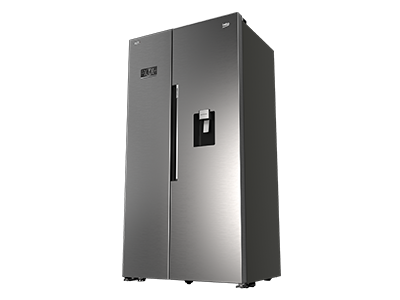Need more support?
Find FAQ's, video guides, articles and more.
No results found!
Everything you need to know about
I need help with

It is recommended that you defrost your refrigerator's freezer unit approximately once a month or when the frost build-up reaches a thickness of 0.5 centimetres.
No-frost refrigerators do not need manual defrosting.
It is normal to hear noises that resemble the sound of running water as your refrigerator is running. These sounds are made when liquid and gas flow inside the refrigerant system. This is not a malfunction.
The sound could also be coming from the water supply if your refrigerator has an ice-maker, or from the automatic defrosting function if your appliance is a no-frost model. Try to determine where the sound is coming from. If it is coming from the freezer area or between the water supply and the ice-maker, the sound is normal and will stop automatically after a while.
If your appliance isn’t operating normally while making this noise, contact an authorised service agent.
It is normal to hear noises that resemble the sound of running water as your refrigerator is running. These sounds are made when liquid and gas flow inside the refrigerant system. This is not a malfunction.
The sound could also be coming from the water supply if your refrigerator has an ice-maker, or from the automatic defrosting function if your appliance is a no-frost model. Try to determine where the sound is coming from. If it is coming from the freezer area or between the water supply and the ice-maker, the sound is normal and will stop automatically after a while.
If your appliance isn’t operating normally while making this noise, contact an authorised service agent.
The sound you're hearing is the door open alarm. If the refrigerator door or doors are left open, the door open alarm will be activated in a few minutes. As soon as you close the door, the alarm will turn off.
It is normal to hear a clicking sound while your refrigerator is running. This sound could be coming from the defrost timer if your appliance is a no-frost model or from the ice making function if your refrigerator is equipped with an ice-maker.
If you have noticed an increase in the internal temperature along with the clicking sound, your appliance’s compressor may be overheating and the clicking sound is the sound of it turning off. The problem may be related to condenser coils.
The condenser is responsible for releasing the heat your appliance produces. Its wires cannot perform efficiently if they are covered with dirt or dust. Unplug your appliance and locate the coils at the back of your appliance. You can clean the coils with a gentle brush or the brush attachment of your vacuum provided it’s set to a low suction power. Do not use damp cloths or towels when cleaning the condenser coils.
If your appliance is not operating normally while making this noise, consider contacting an authorised service agent.
It is normal to hear a cracking sound as your refrigerator is running. This sound could be coming from the refrigerator components contracting or expanding, or from falling ice cubes if your refrigerator is equipped with an ice-maker. This is likely not a malfunction.
If your appliance is not operating normally while making this noise, consider contacting an authorised service agent.
It is normal for your refrigerator to make noises while running.
If you feel that the noises are too loud or unusual, or if the appliance isn’t operating normally while making this noise, contact an authorised service agent.
It is normal to hear a hissing sound if your refrigerator has a no-frost function. This sound could be coming from water dripping on the defrost heaters. This is not a malfunction.
If your appliance is not operating normally while making this noise, contact an authorised service agent.